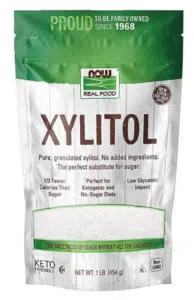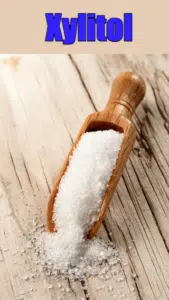Xylitol: A Sweet Solution to Tooth Decay?
What if you could reduce tooth decay by 25%? That would be impressive, right? But what if you could reduce cavities by 40%? Now that’s something to get excited about! For decades, dentists have been fighting the battle against tooth decay using various methods, from improving home care to controlling diet and using chemical agents like chlorhexidine and fluoride.
Most of us would agree—a 25% to 40% reduction in tooth decay sounds great. But what if a mother could help her five-year-old reduce tooth decay by as much as 70% compared to kids who received fluoride or chlorhexidine varnishes? That’s a game-changer! Studies show that mothers who chewed xylitol gum two to three times a day, starting three months after delivery until their child turned two, saw significant reductions in cavity-causing bacteria in their children up to six years of age. The secret? Xylitol gum.
What is Xylitol?
Xylitol is a naturally occurring sugar alcohol found in the fibers of fruits and vegetables, often extracted from corn husks and birch trees. It’s a tooth-friendly, diabetic-friendly sweetener that helps combat tooth decay.
How Does Xylitol Work?
Unlike common sugars like sucrose, xylitol does not ferment or produce acid, which breaks down tooth enamel. Instead, xylitol helps to remineralize teeth by allowing critical minerals like calcium and phosphate to redeposit onto enamel surfaces before decay forms. Additionally, xylitol-containing saliva is more alkaline than saliva exposed to other sweeteners, making it less likely to contribute to cavities.
Xylitol has specific antibacterial properties, particularly against Streptococcus mutans, the primary bacteria responsible for cavities. It also inhibits other harmful bacteria like Streptococcus pneumoniae and Haemophilus influenzae, making it beneficial as a nasal spray for upper respiratory health.
The Benefits of Xylitol for Tooth Decay
- Reduces Tooth Decay: Studies from Finland in the 1970s showed that people who chewed xylitol gum had significantly fewer decayed, missing, or filled teeth compared to those who chewed sucrose gum.
- Remineralizes Teeth: Xylitol helps repair enamel before decay has time to form.
- Fights Harmful Bacteria: It specifically targets cavity-causing bacteria, reducing their ability to stick to the teeth and cause damage.
The FDA has approved xylitol as a safe product that does not promote tooth decay, further supporting its role in maintaining oral health.
Are There Any Risks?
While xylitol is generally safe for humans, excessive consumption can lead to temporary gastrointestinal issues like bloating, gas, and diarrhea. However, most people adapt over time, increasing their tolerance for xylitol.
Important Note for Pet Owners: Xylitol can be highly toxic to dogs, causing severe drops in blood sugar and, at high levels, liver failure. Always keep xylitol-containing products out of reach of pets.
Xylitol Products and Sourcing Concerns

However, be mindful of where your xylitol comes from. Some sources, particularly from China, have been linked to contamination concerns. Opt for xylitol products from trusted distributors and check labels to ensure they are not mixed with aspartame or other artificial sweeteners that could pose health risks.
How Much Xylitol is Needed for Cavity Prevention?
Research suggests that around six grams of xylitol per day—equivalent to about twelve pieces of gum—can provide significant cavity-fighting benefits. So, would you rather spend hours in the dental chair or chew some gum daily? The choice is yours.

